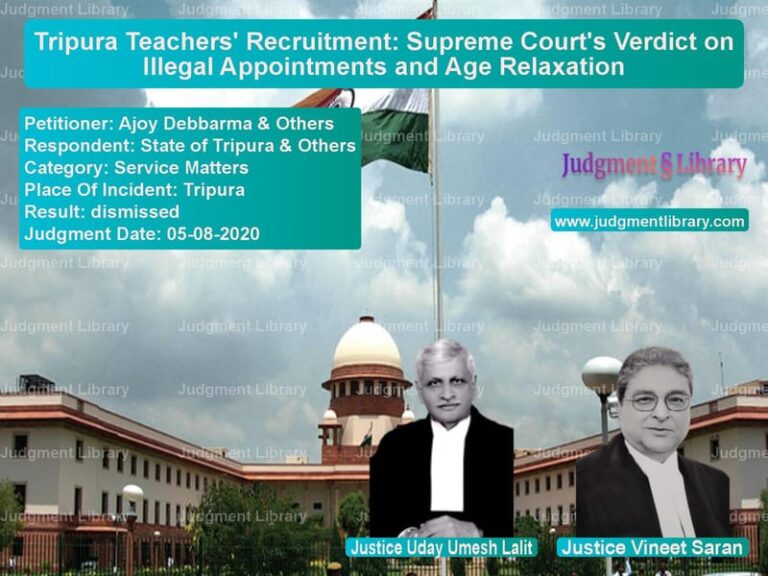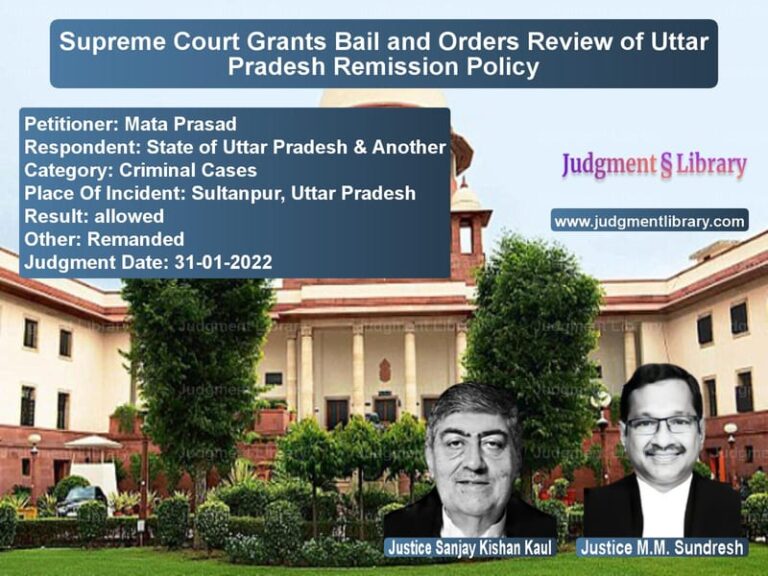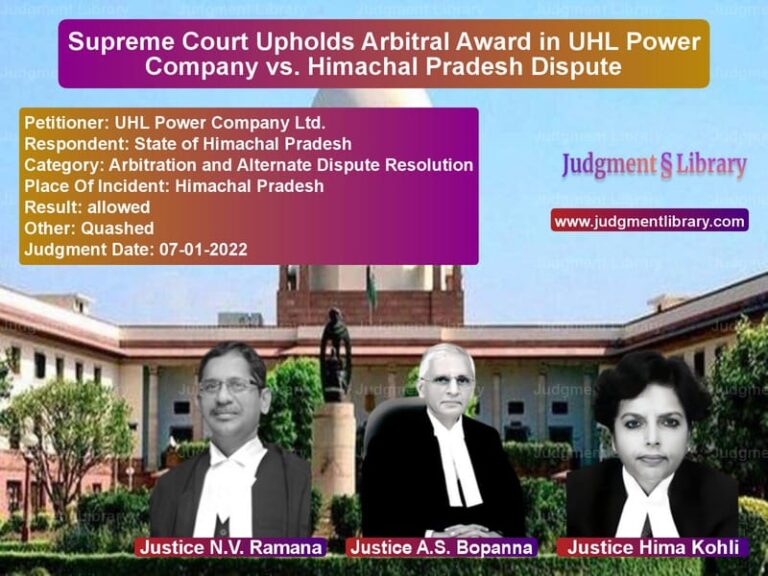Supreme Court Rules on Power Tariff Dispute: All India Power Engineer Federation vs. Sasan Power Ltd.
The case of All India Power Engineer Federation & Ors. vs. Sasan Power Ltd. & Ors. revolved around the issue of the Commercial Operation Date (COD) of an ultra-mega power project in Madhya Pradesh. The dispute, which reached the Supreme Court, had significant financial implications, as it determined the tariff structure applicable to consumers for 25 years. The Supreme Court, in its judgment delivered on December 8, 2016, overturned the Appellate Tribunal for Electricity’s ruling and reinstated the Central Electricity Regulatory Commission’s (CERC) decision that the COD was not achieved as claimed by Sasan Power Ltd.
Background of the Case
The dispute centered on a power purchase agreement (PPA) signed between Sasan Power Ltd. (a subsidiary of Reliance Power) and various state electricity procurers. The agreement, executed on August 7, 2007, outlined the terms under which Sasan Power Ltd. would supply electricity from its 3960 MW ultra-mega power project in Singrauli, Madhya Pradesh.
Sasan Power Ltd. claimed that its first unit achieved COD on March 31, 2013. If this date were accepted, the tariff applicable for the first contract year would last only a single day, significantly increasing the tariff rates from April 1, 2013, onward. However, state electricity procurers argued that COD could not be considered achieved until August 16, 2013, when the unit met the contractual requirement of operating at 95% of its contracted capacity for 72 continuous hours.
Legal Issues in Question
- Whether the COD claimed by Sasan Power Ltd. was valid under the terms of the PPA.
- Whether the state electricity procurers had waived the requirement of 95% generation capacity for COD.
- Whether the waiver, if any, was legally valid given the impact on consumer tariffs.
- Whether the Appellate Tribunal’s ruling was legally sustainable.
Petitioners’ (All India Power Engineer Federation) Arguments
- The COD claimed by Sasan Power Ltd. was premature and not in accordance with the PPA.
- The performance test certificate issued by the independent engineer on March 30, 2013, was invalid, as the unit did not achieve 95% of its contracted capacity.
- The Appellate Tribunal erred in ruling that state electricity procurers had waived the 95% capacity requirement.
- Any waiver of this requirement would impact consumer tariffs and violate public interest.
Respondents’ (Sasan Power Ltd.) Arguments
- The procurers had accepted the COD date through their conduct and written communication.
- Grid restrictions prevented the unit from achieving 95% capacity, which was beyond Sasan Power Ltd.’s control.
- The independent engineer’s certificate was valid and should be accepted.
- Waiver of the 95% requirement was allowed under the Contract Act and was exercised by the procurers.
Supreme Court’s Judgment
The Supreme Court, comprising Justice Kurian Joseph and Justice R.F. Nariman, ruled in favor of the petitioners and set aside the Appellate Tribunal’s judgment. The key findings were:
- The COD requirements under the PPA were mandatory and could not be waived without proper authority.
- The independent engineer’s certificate was flawed, as it certified COD despite the unit not achieving the required 95% capacity.
- The alleged waiver by procurers was invalid, as any changes affecting tariff must be approved by the electricity regulatory authority.
- The impact on consumer tariffs meant that public interest was involved, making the waiver unenforceable.
- The CERC’s decision to set the COD at August 16, 2013, was legally correct and was reinstated.
Key Legal Takeaways
- Consumer Protection: The Court emphasized that tariff determinations must safeguard consumer interests.
- Strict Enforcement of PPAs: Any deviations from contractual obligations must be formally approved.
- Regulatory Oversight: The electricity regulatory commission has the final authority in tariff matters.
- Limits on Waiver: Even if parties agree to waive contractual requirements, such waivers are unenforceable if they impact public interest.
Conclusion
The Supreme Court’s ruling in All India Power Engineer Federation vs. Sasan Power Ltd. reaffirms the importance of regulatory oversight in the power sector. By ensuring that COD requirements were strictly enforced, the judgment prevented consumers from bearing unjustified tariff increases. The case serves as a precedent for future power sector disputes, emphasizing that financial and contractual decisions must align with legal and regulatory frameworks.
Don’t miss out on the full details! Download the complete judgment in PDF format below and gain valuable insights instantly!
Download Judgment: All India Power Engi vs Sasan Power Ltd. & O Supreme Court of India Judgment Dated 08-12-2016.pdf
Direct Downlaod Judgment: Direct downlaod this Judgment
See all petitions in Company Law
See all petitions in Judgment by Kurian Joseph
See all petitions in Judgment by Rohinton Fali Nariman
See all petitions in allowed
See all petitions in supreme court of India judgments December 2016
See all petitions in 2016 judgments
See all posts in Corporate and Commercial Cases Category
See all allowed petitions in Corporate and Commercial Cases Category
See all Dismissed petitions in Corporate and Commercial Cases Category
See all partially allowed petitions in Corporate and Commercial Cases Category







